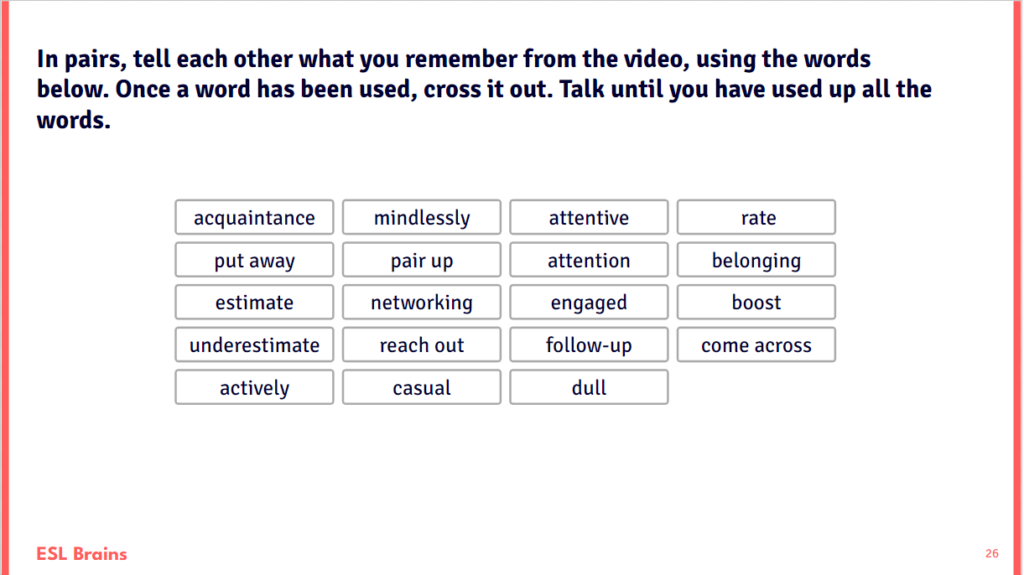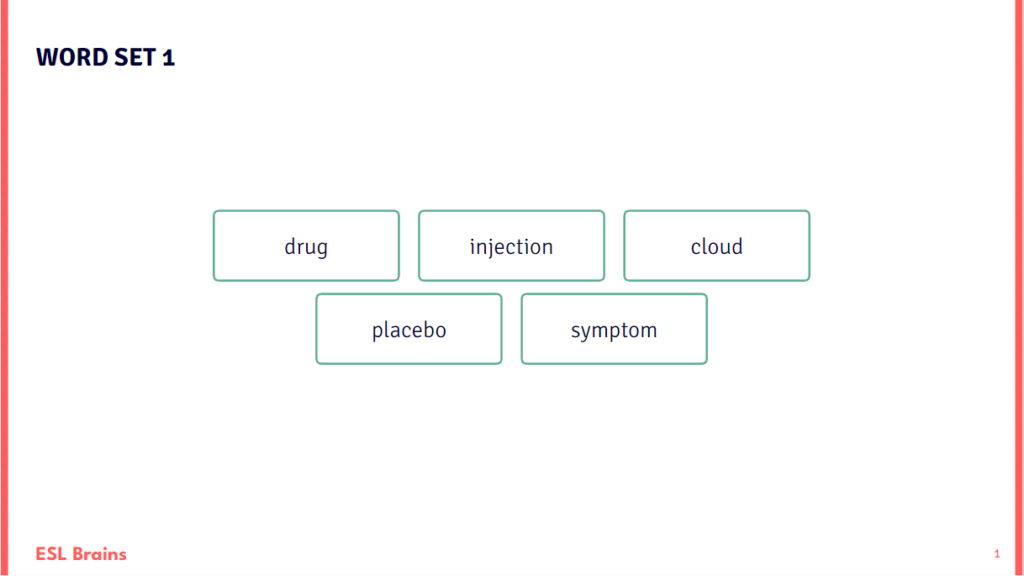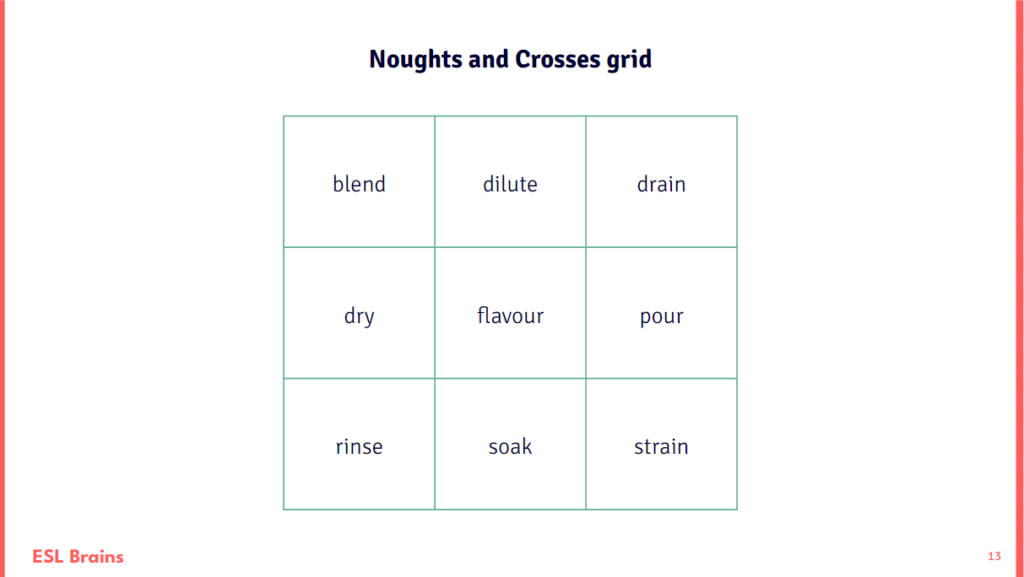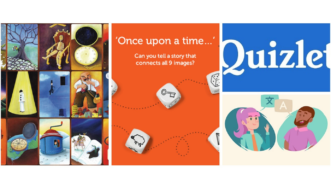Show your students a word once and they will quickly forget it. Make them work with the word, create connections and contexts and use them to think in English, and they are much more likely to use it on different occasions in the future. We have listed six simple vocabluary revision exercises you can use at the beginning or end of a lesson to consolidate your students’ knowledge and make them feel more confident about the vocabulary they learn. The tasks can be used to practise new sets of words, but they are also a great tool for spaced repetition which involves looking back at the lexis studied weeks or even months before, to help embed it in students’ long-term memories. The best news is that the revision ideas require no or hardly any preparation, which saves you time and allows you to use them as often as necessary.
1. Use a list of words to make students recall details about the topic covered in the previous lesson.
A simple ‘What do you remember from the last lesson?’ might not be enough, but showing your students the words related to the topic will jog their memories. While speaking, the students will put the words back in context. It is best to do this exercise in pairs, as it gives students plenty of opportunities to speak. You can simply write the words on the board, or, if you teach online, share them on the screen. See below how we used this idea in the lesson about small talk. The task was used at the end of the lesson, but you could choose to do it at the beginning of the following lesson as well.

2. Use a list of words to make students test each other.
This is another great activity in which the teacher’s preparation is limited to giving students a list of words. In pairs, one student defines one of the words and the other student has to say which word from the list their partner is talking about. With lower levels, you could ask your students to come up with three words they associate with the target word. The word list for this exercise could include the vocabulary studied in the previous lesson, as well as some words your students learned earlier. The advantage of such revision vocabulary exercises is that even if a student is not sure of the meanings of some words, their partner will help them remember.
3. Use two lists of words to make students incorporate new vocabulary into a conversation.
Prepare two lists of words and some conversation topics your students will use in pairs. The topics should not be directly connected with the lexis. Give each student in a pair their own list of words, or send it to them in a private message. Ask them to use the words while discussing one of the topics. This activity will make students create new linguistic contexts for the words, which in turn will make them more likely to use the words in other conversations in the future. An extra challenge could be to ask the students, once they have finished, to guess what words are on their partner’s list. See below how we used this exercise in the lesson about the placebo effect. The conversation topics were not directly connected with medicine (e.g. the key to success, travelling abroad). If your students are creative enough, you might not even have to prepare the topics beforehand. Any topic will do.

4. Use noughts and crosses (a.k.a. tic-tac-toe) to make students come up with connections.
As simple as the game might be, it adds a certain twist to the revision routine. The aim is of course to get three words in a line. See below how we used this exercise in the lesson about milk. The students had to say what foods the verb can be used with, apart from milk. The words you choose to practise could have a common theme or be the same part of speech, and the instruction could vary based on the words used. If you choose adjectives, ask students to say who or what is like this. If you choose verbs, ask them to say who or what does it and in what situation. They could also put the word in a sentence, which would be great grammar revision, e.g. for auxiliary verbs or irregular verbs. If you teach in class, give each pair a copy of the grid. If you teach online, share a grid with each pair. If there is a quick winner, the pair can work with the remaining words, too.

5. Use sets of two words to make students create links.
This activity is useful if you look for vocabulary revision exercises covering different topics. You simply take two random words studied previously and ask your students to think how they could be linked. They might find some connection between them, or create a logical sentence with both of them. If the words are stare and crucial, a possible link could be that when somebody talks about a crucial issue, some people will stare at them. If the words are dishonest and mow, the students could say that a person was asked to mow the lawn but they didn’t want to do it so they were dishonest and said they were busy. Don’t underestimate your students’ creativity here. You might not see any connection where somebody else will find two. Once you have your list of words, pick pairs at random and read them to your students one by one.
6. Create context to make students recreate words.
This idea might require some thinking through at the beginning, but when you get the hang of it, you will never be short of ideas. Ask your students several questions using a target word in each. Tell them to write down simple, one- or two-word answers. The students will then look at the answers and recreate either the whole question, or just the target word. For example, if you want to revise the word disposable, ask your students what can be disposable. Let’s say they write a mask. If it is nudge, ask them what their friends sometimes nudge them to do and they could write quit smoking. Continue with other questions. After finishing, ask them to look at the answers they’ve written and say what you asked about. They will see a mask and remember disposable. They will see quit smoking and recall their friends nudging them. This is also a good activity to study specific grammar points, like verb patterns (e.g. ‘What do you avoid doing?’) or comparatives (e.g. ‘What is noisier than a car?’).
Even short, but regular, revision will help your students incorporate the studied vocabulary into everyday use. Try out our no- and low-prep activities and see what a huge difference it makes to review lexis in the lesson on a regular basis. Let us know how it went. We would also like to know what vocabulary revision exercises you use in your classroom, so tell us what works with your students!














Number 6 is great! I usually ask such questions to anchor the word when we meet it at the text. But I will definitely try it for vocab revision.
This article and the activities made me regret not teaching group lessons =)
Some activities seem funnier with group mates than with the teacher
Definitely, group dynamics make a lot of these tasks even much more fun but I’m sure they can be as effective and engaging in 1-on-1 classes as well. Give them a try and share your experiences with us.
Great ideas! Thanks for this input.
This is absolutely love and finding ESL Brains was an even lovelier.
Thanks for everything
*absolutely lovely (Sorry, I haven’t had enough coffee yet).
This is a Great boost guys. Just when my lessons started feeling a bit repetitive, this just gave me lots of ideas. Thanks!
Happy to hear that you enjoy this blog post. I encourage you to share with us your feedback after using some of these activites. We’ll be publishing more articles like that in the future with some teaching tips and ideas from our team.